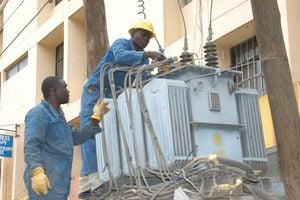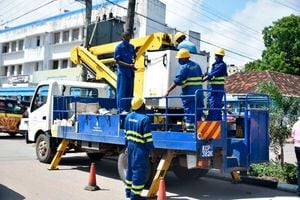
The committee has met various stakeholders, including owners of the IPPs that have been accused of signing skewed contracts with the government thereby contributing to the high electricity cost.
Last April, the National Assembly passed a motion sponsored by Laikipia Woman Rep Jane Kagiri that effectively triggered an investigation by parliament over the high cost of electricity.
In passing the motion, the lawmakers barred both the Ministry of Energy and Kenya Power from signing any new deals with Independent Power Producers (IPPs) until the inquiry was complete.
The committee’s terms of reference included engaging the Ministry of Energy and Kenya Power in a bid to stop further deals with the IPPs, which had been blamed for runaway costs, and negotiating with power producers with a view of reducing the cost of power.
Energy sources
The committee was also tasked to look into factors affecting the cost of electricity, including over-reliance on IPPs against available renewable and other energy sources and provide measures to reduce it.
A week later, the National Assembly Committee on Energy started meeting various stakeholders in the energy sector with a view to finding solutions to the crisis. The committee that was chaired by Mwala MP Vincent Musyoka was to conduct an inquiry and present a report to the House in 120 days with clear recommendations on how to cushion consumers. It held its first meeting on June 15, last year, but it’s been one year and two months without a clear road map of how to bring down electricity prices.
Mr Musyoka did not respond to text message on the progress of the inquiry and when a report should be expected. However, committee vice-chair Lemanken Aramat said the report will be tabled next week despite the House being scheduled to start its recess this Friday.
“We are not badly off, the report will be tabled next week. We are already done,” Mr Aramat told the Nation. However, despite gobbling millions of shillings in taxpayers’ money in the form of allowances, 14 months down the line, no tangible report has been presented to the House. Ms Kagiri expressed her frustration to the Nation.
“I will ask for the report on the floor of the House. They were given 120 days,” she lamented.
Electricity Consumers Society of Kenya Executive Director Isaac Ndereva said the main drivers of fluctuating costs are Fuel Energy Charge and Forex Charge which are supposed to use a gazetted formula to obtain the amount per kilowatt-hour (kWh).
Illegal money
Mr Ndereva said these two components have been used for a long time to channel illegal money to IPPs and oil marketing companies which then find a way to cartels.
“The moment the committee doesn't want to look into these two issues through experts, then the inquiry is dead on arrival and nothing will come of it. No wonder they have taken a lot of time but nothing substantial can be reported,” he said.
“The explanation regarding how Sh70 billion was siphoned through Kenya Power under instruction from Epra [Energy and Petroleum Regulatory Authority], which was also picked by the auditor-general, has never been of any interest to the committee. You then wonder what they are investigating if not such a glaring matter,” he added.
During the vetting of Energy Cabinet Secretary Opiyo Wandayi, National Assembly Speaker Moses Wetang’ula said he was at one time slapped with a Sh500,000 electricity bill in his house. Mr Wetang’ula, who wanted Mr Wandayi to explain what he will do to tame the high cost of electricity, said Kenya Power even went ahead to disconnect his electricity as he was looking for ways to settle the bill.
It is now emerging that the committee has been grappling with the high cost of terminating the contracts of the IPPs, which, if breached midway, will see taxpayers pay the 13 firms Sh264 billion as compensation. The committee is on the horns of a dilemma on how to handle the long-term Power Purchasing Agreements (PPAs), some of which are running up to 2034. The long winding process of implementing some of the declarations the committee has been making in meetings is also a major factor in bringing the desired changes.
For instance, breaking Kenya Power into eight bodies will require several amendments to the existing laws, which must be subjected to public participation.
The committee has also faced difficulties in accessing some information about ownership of the IPPs. Attempts to use the Office of the Attorney-General last year for mutual legal assistance fell through.
The tough conditions set by IPPs such as extending the contracts so as to allow them to pay their loans with ease, reducing the fuel energy cost and threats to go court for huge awards have also hindered efforts to tame the high cost of power. The National Assembly Committee on Implementation, which is chaired by Budalangi MP Raphael Wanjala, yesterday summoned Kenya Power boss Joseph Siror to explain steps taken to reduce electricity costs.
Dr Siror told MPs Kenya Power has not signed any agreements since the House placed a moratorium on new contracts. He said the firm has submitted all the requested information to the Energy committee.
The committee, however, sent back Dr Siror requesting him to come back with more details.
“We want to see a list of those IPPs that you have because some of these IPPs can conspire to raise the cost of electricity,” said Kanduyi MP John Makali. The latest review done by Epra increased the electricity prices, which will now see domestic customers pay an average of 42 cents more for a unit of power used than what they paid in July.
In Epra’s review, consumers will pay about 1.5 percent more for a unit of electricity used in August, new computations show, on higher fuel and forex costs. For example, this category of customers will pay Sh2, 877 for 100 units this month, compared to Sh2,832 in July.
The committee has met various stakeholders, including owners of the IPPs that have been accused of signing skewed contracts with the government thereby contributing to the high electricity cost.
Capacity charges
Despite IPPs charging higher capacity charges, a cost that is passed down to the consumers, Auditor-General Nancy Gathungu told MPs last year that the firms were operating below their contracted capacity. This means that consumers are paying IPPs more for capacity charges than the actual power the IPPs sell to Kenya Power.
“It was noted that the capacity charge costs for Independent Power Producers during the two years (2020/2021 and 2021/2022) were higher than the cost of the energy purchased indicating that the IPPs were operating below their contracted capacity resulting in payment for idle capacity,” Ms Gathungu said. According to the audit report for the financial year 2019/2020, taxpayers paid Sh47.5 billion to IPPs as capacity charge and Sh49.2 billion in 2020/2021.
“Any idle capacity on the IPP is borne by the consumer due to capacity charge contractual obligation and will extend through the contract which is normally 20 to 25 years,” Ms Gathungu told MPs.
Capacity charge is the amount that is payable to an IPP regardless of whether they generate power or not. It prescribes the minimum power that an IPP is expected to add to the national grid and pays for it regardless of whether there is underproduction.
The committee has met Kenya Power and Epra several times and made recommendations on how to tame the high cost of power but none has been put to paper and adopted.
Among the proposals that have been floated in the several meetings include breaking the monopoly of Kenya Power and bringing in other players in order to make the industry competitive, a move that the MPs say will give consumers a variety to choose from and eventually lower the cost of power.
In March this year, the committee in one of the meetings said it is working on a Bill with proposals to remove all the stringent measures put in place that deter other firms from selling electricity meters directly to Kenyans.
“We are working on a Bill as a committee and will soon be introduced to the House. It will contain all these changes,” Mr Musyoka said.
This Bill is however yet to be introduced in the House five months later. The committee also last week came up with a proposal seeking to split Kenya Power into eight regional independent bodies as a way of addressing inherent inefficiencies at the utility firm.
Ms Gathungu in her report covering the 2017/2018 and 2020/2021 financial years, says Kenya Power spends Sh5.3 per KWh to buy power from Kenya Electricity Generating Company (KenGen) compared to an average of Sh15.3 per KWh from the IPPs.
According to the audit report, in the 2018/2019 financial year, Kenya Power made a loss of Sh70 billion which increased to Sh75 billion in the 2019/2020 financial year.
The losses reduced to Sh66 billion in the 2020/2021 financial year and to Sh56 billion in the 2021/2022 financial year.









